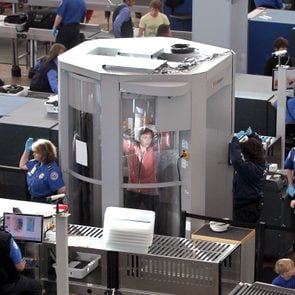You’re at the airport, checking in your carefully packed suitcase, confident that the padlock you’ve clamped to the zipper will keep all your belongings safe. But how much protection do locks really offer?
While they may feel like a safeguardand let’s face it, options are limited when it comes to securing luggagethe truth is that most locks provide little more than a false sense of security. In fact, they’re about as effective as tying your zippers with a flimsy piece of string. Read on to find out why padlocks may not be the best choice for luggage protection and to discover some smart ways to protect your personal belongings.
GetReaders DigestsRead Up newsletter for more travel, tech, cleaning, humor and fun facts all week long.
What’s wrong with depending on a padlock?
Sure, padlocked luggage provides extra peace of mind, but the reality is that those little hunks of metal can often do more harm than good. Despite the safety measure, thieves can still easily break into suitcases. To make matters worse, that brand-new lock could be a blaring signal to potential thieves to “pick me.” Add to this the potential complications of TSA inspections, and the drawbacks of using a padlock quickly outweigh the perceived benefits.
They’re easy to break into
The TSA provides agents with universal keys to open locks approved by the agency, ensuring they can inspect luggage without damaging locks. But even without these tools, accessing most zippered suitcases is surprisingly simple, as demonstrated by one TSA agent in a viral TikTok video.
@geenaanac Whenever you are traveling watch this TSA #tsa #travell #fyp #flliiippppeeeeedddddd #viralvideo #new #duet original sound – Geenaanac
“A lot of people I see travel with locks on their suitcases with special combinations, but with just a pen, you’re actually able to breach a suitcase’s security,” the agent explains. He demonstrates this by running a pen along the zipper’s seam, bypassing the lock and opening the suitcase within seconds.
His advice? “The best kinds of zippers have covers over them,” he says. “That’s an extra added layer of security for your luggage when you’re traveling for the holidays or for any occasion that may be coming up.”
Thieves may think there’s something valuable in your luggage
Ironically, a padlock can act as a magnet rather than a deterrent for would-be thieves eyeing your luggage. Locks can give the impression that there’s something worth stealing inside, even if your securely closed suitcase is just packed with a week’s worth of dirty clothes.
Locks can create more problems than they solve
The TSA advises travelers to use only TSA-approved locks, identifiable by the red diamond Travel Sentry logo. While agents can typically conduct an electronic screening, they occasionally need to inspect luggage physically. If the master key doesn’t work or you’ve used a unapproved lock, agents may be forced to cut the padlock, potentially damaging the device, the suitcase and its contents.
And there’s another risk, according to the TSA: Locks can sometimes get caught in baggage-handling conveyor belt systems, leading to damage. In situations like this, your suitcase’s lock could turn into a one-way ticket to a travel fail.
What are better ways to keep your luggage safe?

Instead of (or in addition to) relying on a TSA-approved padlock, consider some of these other strategies for keeping your belongings protected while in transit.
- Choose a hard-shell suitcase: The locks built into hard-shell luggage won’t get caught in baggage-handling conveyor belts, and the overlapping plastic edges on these suitcases make it harder for basic tools, like pens, to breach their security.
- Wrap your suitcase: There’s a reason those plastic-wrapping services at airports are so popular. They create an extra layer of security by making your luggage harder to open, requiring more effort and time to tamper with. As an added bonus, your contents are unlikely to spill out if the bag is accidentally opened.
- Keep important items close at hand: The best way to prevent essential and valuable items from getting nicked from a locked bag is by not putting them in there in the first place. Always store those items in your carry-on, where you can keep an eye on them.
- Use luggage-tracking devices: For extra peace of mind, put GPS-enabled tags in suitcases in case they go missingsuch as during flights with layovers or unexpected delays. While bags are generally safe in an airline’s possession, if one is temporarily misplaced, you can still track its location and improve the chances of recovering both your luggage and its contents.
- Stay aware: Even better than slapping a flimsy lock on your luggage is keeping a close eye on it. Avoid leaving your bag unattended for long, and keep it within your sight to reduce the risk of theft.
Why trust us
Reader’s Digest has published hundreds of travel stories that help readers explore the world safely, easily and affordably. We regularly cover topics such as the best places to visit (and the best times to visit them), tips and tricks to zoom through airport security, flight-attendant secrets, hotel-room hacks and more. We’re committed to producing high-quality content by writers with expertise and experience in their field in consultation with relevant, qualified experts. We rely on reputable primary sources, including government and professional organizations and academic institutions as well as our writers’ personal experiences where appropriate. For this piece, Aaron Rasmussen tapped his experience as a longtime travel writer and travel guidebook editor to ensure that all information is accurate and offers the best possible advice to readers. Read more about our team, our contributors and our editorial policies.
Sources:
- Travel Sentry: “Understanding TSA Locks”
- @Geenaanac on TikTok: “Whenever you are traveling, watch this TSA”
- TSA: “TSA Recognized Locks”
The post Here’s Why You Should Never Use a Padlock on Your Luggage appeared first on Reader's Digest.
from Reader's Digest https://ift.tt/XeGAYM9



Comments
Post a Comment